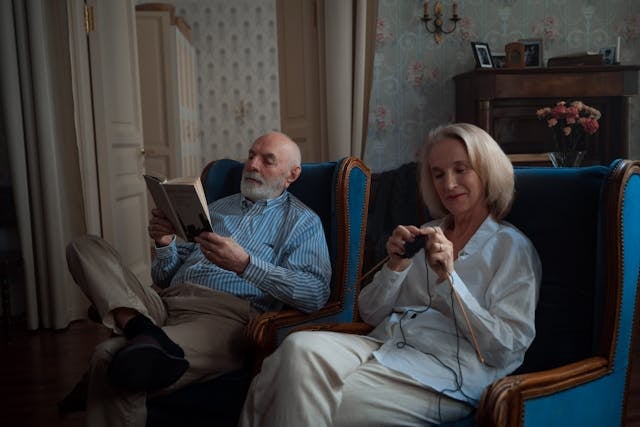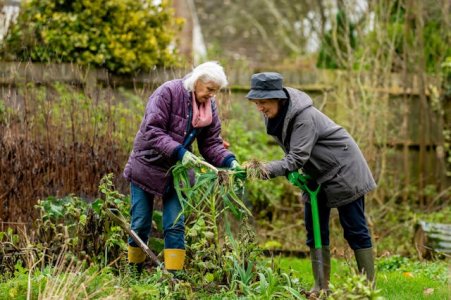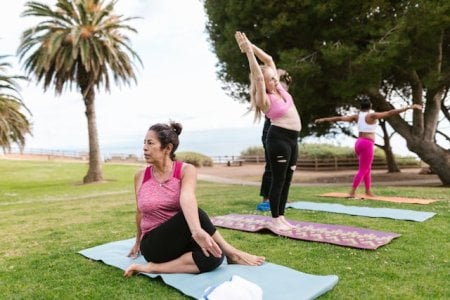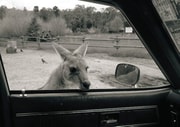
Retirement isn't the end of adventure—it's the beginning of a whole new chapter. For 4.2 million Australian seniors, that chapter is looking brighter and more active than ever before.
These older Australians are participating actively in the workforce and public life, providing enormous contributions to Australia's society, culture, communities, workplaces and economy.
The secret to their vitality? It might just be found in their hobbies.
Recent groundbreaking research spanning 16 countries revealed that hobby engagement was associated with better mental and self-reported health in adults aged 65 years and older, with participants showing fewer depressive symptoms and higher levels of self-reported health.
The benefits aren't just feel-good stories—they're scientifically proven pathways to a longer, happier life.
The power of purposeful play
Hobbies involve imagination, novelty, creativity, sensory activation, self-expression, relaxation and cognitive stimulation, all of which are positively related to mental health and wellbeing.
Participation in hobby groups can additionally provide social support and reduce loneliness and social isolation.
For Australian seniors, this matters enormously. The Australian Department of Health recommends that older Australians accumulate at least 30 minutes of physical activity each day, but the benefits extend far beyond physical fitness.
Whether you're looking to stay sharp, make new friends, or find joy in everyday moments, these 12 hobbies offer pathways to a more vibrant retirement.
Pickleball: Australia's fastest-growing senior sport
Move over, tennis—there's a new racquet sport taking Australian courts by storm. Pickleball combines elements of tennis, badminton, and table tennis, played on a smaller court with a lower net and paddle-like racquets.
Research shows that those who played racquet sports showed a significant reduction in risk of death by any cause. The sport is particularly senior-friendly because the smaller court means less running and wear on joints, such as knees, hips, and ankles.
Many Australian communities are embracing pickleball, with dedicated courts popping up from Melbourne to Perth. Local clubs welcome beginners, and the social aspect means you'll likely make new friends while getting fit.
Musical instruments: Never too late to make beautiful music
Whether it's the ukulele, harmonica, or even piano, picking up an instrument later in life offers profound rewards. Music can help reduce anxiety, lower blood pressure, and alleviate pain, while the act of creating music amplifies these benefits significantly.
The ukulele has experienced a renaissance in Australia, with senior groups forming in libraries, community centres, and retirement villages across the country. Online platforms like YouTube offer free lessons, while local music shops often run beginner-friendly group classes.
Don't underestimate your voice either—community choirs are thriving in Australia, from the big cities to regional towns. The social connection, combined with the cognitive challenge of learning new songs, creates a perfect blend of benefits.
Dancing: From ballroom to Zumba
Australians have always loved to move, and retirement is no time to stop. Dancing offers numerous benefits, including improved heart health, stronger bones, better balance, and pure joy.
Research shows older adults reported enhanced social and mental health wellbeing from activities, including engagement in hobbies and leisure activities. Zumba classes specifically designed for seniors (sometimes referred to as 'Zumba Gold') are available at most YMCAs and community centres across Australia.
For those who prefer more traditional styles, ballroom dancing, line dancing, and even social dancing groups offer welcoming environments for beginners. The key is finding a style that makes you smile.
Australian senior activity statistics
- 4.2 million Australians are aged 65 and over (16% of the population)
- Cooking/baking and travelling are the most popular Australian hobbies
- Aqua aerobics is one of the most popular physical activities for older adults
- 67% of seniors receive Age Pension or other government support
Birdwatching: Discovering Australia's feathered treasures
Australia is home to some of the world's most spectacular birds—from rainbow lorikeets to kookaburras. Birdwatching gets you outdoors, sharpens observation skills, and connects you with nature.
Bird watching promotes relaxation while spending time outdoors and can be a gentle introduction to wildlife and nature. Begin with a bird identification book or app in your own backyard, then expand to local parks and nature reserves.
Many regions have active birdwatching groups that welcome newcomers. BirdLife Australia offers resources and can connect you with local clubs. The bonus? You'll become more environmentally conscious and might even be inspired to create bird-friendly spaces in your garden.
Gardening: Growing health and happiness
There's something magical about putting your hands in Australian soil and watching things grow. A 2024 study published in the Journal of Environmental Psychology found that a greater frequency of gardening in life is associated with a greater lifetime cognitive gain.
Focus on native Australian plants to support local wildlife and reduce water usage. Plants like grevilleas, banksias, and native grasses not only thrive in Australian conditions but also attract beautiful native birds and beneficial insects.
For those who struggle to reach the ground for planting, weeding and harvesting, raised garden beds are a fantastic solution to get outside, enjoy the sunshine and commune with nature.
Local nurseries often run workshops on native gardening, and groups like Landcare Australia can connect you with community gardening projects.

Travelling: Rediscovering Australia and beyond
With time on your hands and possibly fewer financial constraints, retirement is the perfect time to explore. Travel boosts brain health, heart health, and overall happiness, while also reducing mortality and the risk of dementia.
Australia offers incredible diversity—from Tasmania's wilderness to Queensland's coral reefs. Senior-friendly travel options include escorted coach tours, river cruises, and rail journeys, such as the Indian Pacific or The Ghan.
For international travel, consider off-peak seasons for better value and smaller crowds. Many travel companies now cater specifically to senior travellers, offering slower-paced itineraries and accessible accommodations.
Writing: Capturing your story
Your life story matters, and retirement gives you time to tell it properly. Digital storytelling shows promise as a practical approach for supporting the well-being of older adults, with activities that involve learning to keep the mind active and engaged.
Tools like StoryWorth send weekly prompts to help you write your memoir, with the finished product becoming a bound book for your family. Local libraries often run memoir-writing groups, and Writers' Centres in major cities offer courses specifically for seniors.
Even simple journaling offers benefits—reducing stress, enhancing memory, and strengthening your sense of purpose.
Gaming: Play to win
Don't underestimate the power of games—both traditional and digital. Playing games can help improve memory, concentration, problem-solving skills, and teamwork.
Traditional games like bridge, Scrabble, and mahjong have active communities across Australia. Many RSLs, community centres, and libraries host regular game nights. For solo mental exercise, crosswords, Sudoku, and even smartphone games can provide cognitive stimulation.
The social aspect of group gaming is particularly valuable for combating isolation and building friendships.
Crafting: Creating beauty with your hands
Activities such as quilting, sewing, embroidering, needlework and making jewellery are ideal because they can be done alone and are a great way of stimulating the brain and keeping the mind alert, usually producing a piece of finished work that the artist can be proud of.
Australia has a rich tradition of crafts, from Aboriginal art techniques to colonial quilting. Community centres, libraries, and craft shops often run classes for beginners. The Men's Shed movement has spread across Australia, providing spaces for woodworking, metalwork, and other hands-on projects.
Don't worry about perfection—the process is as valuable as the product.
Cycling: Rediscovering the joy of two wheels
Tennis and cycling are fantastic for muscle strength, heart health and balance, as well as hand-eye coordination. Australia's extensive network of bike paths and rail trails makes cycling a safe and accessible option for seniors.
If balance is a concern, consider an adult tricycle or electric bike, which can help you tackle hills without overexertion. Many areas have senior cycling groups that ride at comfortable paces and stop for coffee along the way.
Always wear a helmet and start with short, flat routes before building up distance and difficulty.
Volunteering: Giving back, getting more
One 2020 study showed that adults age 50+ who volunteered 100 or more hours per year had a reduced risk of mortality and physical functioning limitations, higher physical activity, and better psychosocial outcomes.
Australia offers countless volunteering opportunities: Meals on Wheels, wildlife rescue, hospital support, literacy programs, and museum guides. Volunteering Australia can help you find opportunities that match your interests and skills.
Many organisations offer flexible arrangements and provide training, making it easy to contribute meaningfully to your community.
Yoga: Flexibility for body and mind
Yoga is an excellent hobby for physical and mental health, enhancing flexibility, encouraging relaxation, and can be adjusted according to the individual's ability.
Chair yoga is particularly popular among Australian seniors, offering the benefits of yoga without getting down on the floor. Many community centres and libraries offer free or low-cost classes designed specifically for older adults.
The breathing techniques alone can help manage stress and improve sleep quality—benefits that extend well beyond the yoga mat.

Starting your hobby journey
Remember, the best hobby is the one that brings you joy. Start small, be patient with yourself, and don't be afraid to try something completely new. Research shows that ensuring equality in hobby engagement should be a priority for promoting healthy ageing.
[Many Australian councils offer senior activity programs, and local libraries are treasure troves of information about community groups and classes. Don't let cost be a barrier—many activities are free or low-cost, and the health benefits far outweigh any initial investment.[/p]
Whether you choose the gentle art of birdwatching or the energetic fun of Zumba, your future self will thank you for taking that first step towards a more active, engaged, and joyful retirement.
What hobbies will you try off this list? We'd love to hear about your retirement adventures and discoveries in the comments below.







